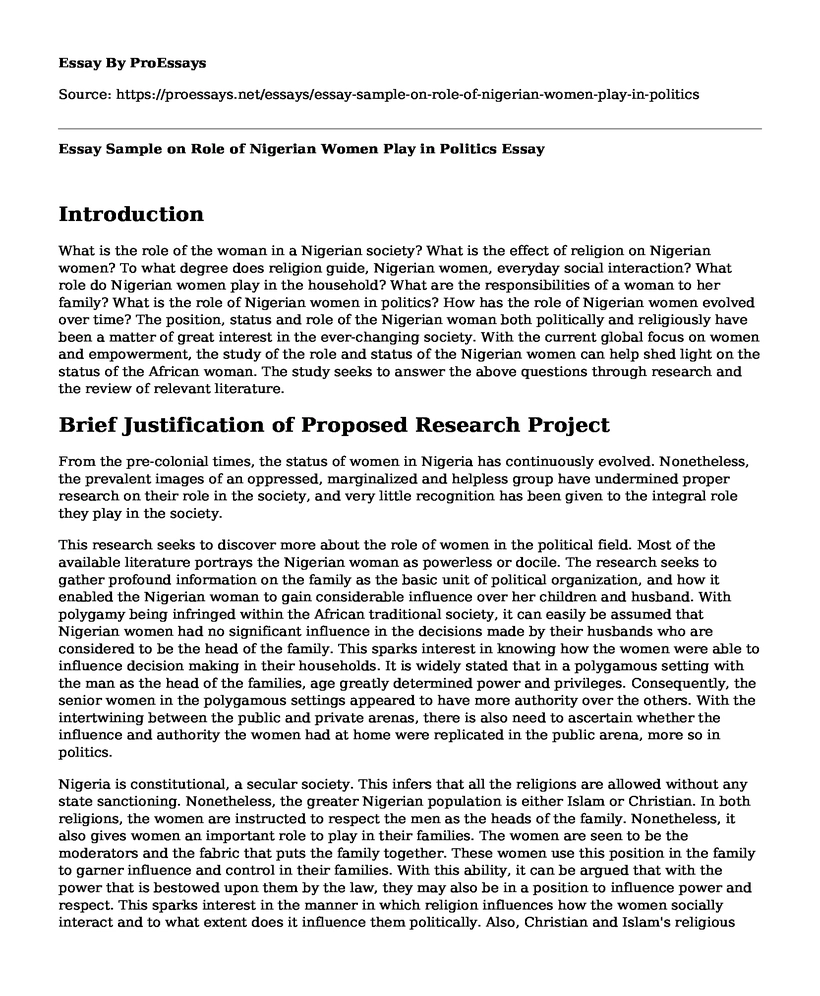Introduction
What is the role of the woman in a Nigerian society? What is the effect of religion on Nigerian women? To what degree does religion guide, Nigerian women, everyday social interaction? What role do Nigerian women play in the household? What are the responsibilities of a woman to her family? What is the role of Nigerian women in politics? How has the role of Nigerian women evolved over time? The position, status and role of the Nigerian woman both politically and religiously have been a matter of great interest in the ever-changing society. With the current global focus on women and empowerment, the study of the role and status of the Nigerian women can help shed light on the status of the African woman. The study seeks to answer the above questions through research and the review of relevant literature.
Brief Justification of Proposed Research Project
From the pre-colonial times, the status of women in Nigeria has continuously evolved. Nonetheless, the prevalent images of an oppressed, marginalized and helpless group have undermined proper research on their role in the society, and very little recognition has been given to the integral role they play in the society.
This research seeks to discover more about the role of women in the political field. Most of the available literature portrays the Nigerian woman as powerless or docile. The research seeks to gather profound information on the family as the basic unit of political organization, and how it enabled the Nigerian woman to gain considerable influence over her children and husband. With polygamy being infringed within the African traditional society, it can easily be assumed that Nigerian women had no significant influence in the decisions made by their husbands who are considered to be the head of the family. This sparks interest in knowing how the women were able to influence decision making in their households. It is widely stated that in a polygamous setting with the man as the head of the families, age greatly determined power and privileges. Consequently, the senior women in the polygamous settings appeared to have more authority over the others. With the intertwining between the public and private arenas, there is also need to ascertain whether the influence and authority the women had at home were replicated in the public arena, more so in politics.
Nigeria is constitutional, a secular society. This infers that all the religions are allowed without any state sanctioning. Nonetheless, the greater Nigerian population is either Islam or Christian. In both religions, the women are instructed to respect the men as the heads of the family. Nonetheless, it also gives women an important role to play in their families. The women are seen to be the moderators and the fabric that puts the family together. These women use this position in the family to garner influence and control in their families. With this ability, it can be argued that with the power that is bestowed upon them by the law, they may also be in a position to influence power and respect. This sparks interest in the manner in which religion influences how the women socially interact and to what extent does it influence them politically. Also, Christian and Islam's religious books have only mentioned a few incidences where women have been prophets or leaders. This also influences thought on the effect of being religious on the Nigerian woman.
The Nigerian woman was greatly threatened during the 20th century when colonialism and patriarchy combined to change gender relations. Nonetheless, with time, there have been significant changes in society, which has greatly been influenced by education and Western influence. Consequently, this research will also seek to gather knowledge on how the role and position of the Nigerian woman have changed over time.
Work Cited
Agbasiere, Joseph Therese. Women in Igbo life and thought. routledge, 2015.
Asiyanbola, Abidemi. "Patriarchy, male dominance, the role and women empowerment in Nigeria." Poster presentado en la XXV International Population Conference Tours, Francia. 2005.
Coquery-Vidrovitch, Catherine. African women: A modern history. Routledge, 2018.
Mba, Nina Emma. Nigerian women mobilized: Women's political activity in Southern Nigeria, 1900-1965. Berkeley: University of California, 1982.
Ogunlela, Yemisi I., and Aisha A. Mukhtar. "Gender issues in agriculture and rural development in Nigeria: The role of women." Humanity & social sciences Journal 4.1 (2009): 19-30.
Zaid, Yetunde Abosede, and S. O. Popoola. "Quality of life among rural Nigerian women: The role of information." (2010).
Cite this page
Essay Sample on Role of Nigerian Women Play in Politics. (2022, Dec 03). Retrieved from https://proessays.net/essays/essay-sample-on-role-of-nigerian-women-play-in-politics
If you are the original author of this essay and no longer wish to have it published on the ProEssays website, please click below to request its removal:
- Leadership Style in Nigerian Essay Example
- Feminist Ethics Essay Example
- Essay Sample on Preventive Measures of Drug Addiction Among Youths
- Terrorism in India: Decades of Risk & Political Intimidation - Research Paper
- Essay Sample on The Tragic Story of Domestic Campaigner Rosie Batty: A Victim of Domestic Abuse
- End Bullying: Protect Our Kids Now! - Essay Sample
- Research Paper Example on Racial Segregation in the US







